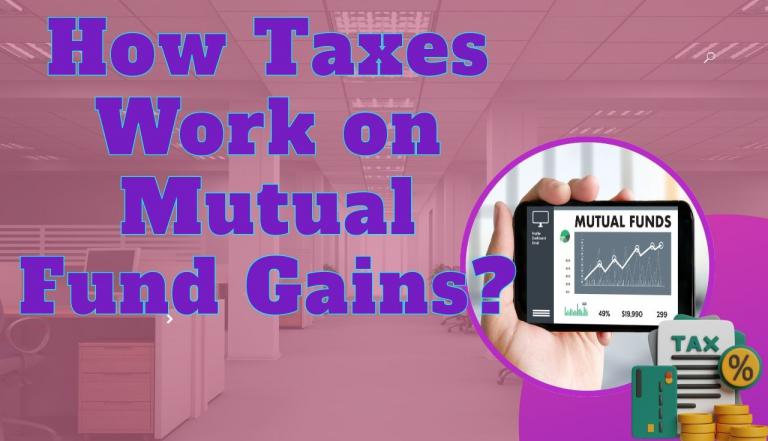How Taxes Work on Mutual Fund Gains?
By Team CodeForBanks | September 18, 2025



Mutual Funds are a popular way to investing for gains. One of the main benefits is that they are tax-efficient. We all invest in Fixed deposits. However, when investing high amounts in FDs, the tax takes on a major part of it. Here's where you get the mutual funds option a suitable one to opt for. They let you benefit with effective money management as well as tax-efficient returns too.

Here are some of the latest related updates:
- There will be no indexing benefit available when calculating long-term capital gains on Debt MFs
- Debt MFs will be taxed based on the applicable slab rates of the investor; capital gains from debt MFs are to be treated as short term capital gains
Tax on Mutual Funds
What is tax on MFs?
There are profits that are gained from investing in MF and are referred to as Capital gains. Now, these mutual fund gains are subject to some tax as per the rules.
This makes it clear why you need asses your gains that will come from MF investments. You need to analyse how much tax you will be paying based on the returns you gain. You can further also pre-calculate the possible deductions wherever applicable.
Factors Used to Determine Tax on MFs
The below are some of the main factors that affect the tax that is levied on mutual funds:
- Types of Funds: The rules of taxation vary based on whether it is a n equity MF, a debt MF, a hybrid MF, etc.
- Dividend: This is the portion of the profit that gets distributed among the investors from the MF houses
- Capital Gains: They are the profits earned when capital assets are sold by investors at a higher price that the total investment value
- Holding Period: This refers to the time between the date when you buy the fund and the date when you sell the MF units. Longer the period, shorter is the tax levied, thus affecting the tax rate payable on capital gains.
You may also like "Types of Mutual Fund Schemes in India"
How are Returns Earned in MFs?
There are two forms in which MF returns are earned:
Dividends
They are paid out by companies when profits are made. Upon being left with surplus cash, the company distributes the share with the investors in proportion to the number of MF units they've been holding.
Capital Gains
It's the profit earned when an investor sells a MF unit for a higher price than its purchase price. Ultimately, appreciation in the MF prices lead to capital gains.
Both these forms of returns from MFs are taxable.
Taxation of Dividends as Offered by Mutual Funds
Dividends are taxed by being added to the taxable income and then being taxed at the respective income tax slab rates.
Earlier, dividends have been tax-free, but that's because DDT was being paid by the companies.
Taxation of Capital Gains as Offered by MFs
The holding period and the MF type are the factors that decide the taxation rate of MFs' capital gains.
Here, the short-term and the long-term capital gains are taxed at different rates.
Don't miss this! "Should You Consider Debt Mutual Funds as Interest Rates Drop?"
Taxation of Short-Term, Long-Term Capital Gains
Notable points include:
- For listed equity shares, a unit of business trust and a unit of an equity-oriented fund, the taxation of short-term Capital Gains has been enhanced to 20% from 15%
- Other financial as well as non-financial assets held for short term will still attract tax at slab rates
- Long-term capital gains' exemption limit on equity share transfer or transfer of equity-oriented units or units of Business Trust has further been risen to Rs.1.25 lakh a year
- The rate at which the same is taxed as also risen to 12.5%
Systematic Investment Plans (SIPs)
SIP is a way to make your MF investments which will help you collecting a handsome corpus with a discplined investment over the years. They allow you to invest a small amount periodically in a MF scheme. You have the liberty to choosing the frequency of the investments made. This can be weekly, monthly, quarterly, even bi-annually or annually.
Remember that you Should not stop your Equity Oriented SIP When the stock market is down because market dips mean lower NAVs (Net Asset Values), allowing your SIP to purchase more units for the same amount. This boosts your portfolio when the market rebounds. Also waiting for the “right time” to restart your SIP is risky. Market recoveries are often sudden, and missing the early upswing can cost you dearly.
Securities Transaction Tax (STT)
0.1% STT is to be levied when you buy or ell MF units of an equity fund or some hybrid equity-oriented fund. It is levied by the government and there is no STT on the sale of the debt fund units.
Recent article "Which Builds More Wealth in 15 Years - SIP or PPF?"
More Latest Articles
-
5 Key Benefits of HSBC Live Plus Credit Card

-
Amazon Pay and ICICI Bank Strengthen Ties to Boost Co-Branded Credit Card

-
Best Senior Citizens Credit Cards in India for 2025

-
Gold Loan May Solve Your One Crisis but Could Create Another

-
How Can You Avoid Paying a Credit Card Annual Fee?

-
How Taxes Work on Mutual Fund Gains?

-
How to Change Your Credit Card Due Date in Minutes?

-
Should You opt for Zero Down Payment Two-Wheeler Loan?

-
Should You Rely on Mobile Apps for Availing Personal Loans?

-
Various Services You Can Access Through ATMs

Upcoming Bank Holidays
- 📅 2025 September 29 is a bank holiday in Andaman And Nicobar Island due to Durga Puja/Dussehra (Maha Saptami).
- 📅 2025 September 30 is a bank holiday in Sikkim due to Durga Puja (Dasain).
- 📅 2025 September 30 is a bank holiday in Andaman And Nicobar Island due to Dusshera (Mahashtami/Mahanavami)/Ayudha Pooja/Durga Puja (Dasain)/Durga Ashtami.
- 📅 2025 October 01 is a bank holiday in Andaman And Nicobar Island due to Dasara/Dussehra (Mahanavami/Vijayadashmi)/Durga Puja (Dasain).
- 📅 2025 October 02 is a bank holiday in Andaman And Nicobar Island due to Mahatma Gandhi Jayanti/Mahalaya Amavasye.
- 📅 2025 October 06 is a bank holiday in Andaman And Nicobar Island due to Lakshmi Puja.
- 📅 2025 October 07 is a bank holiday in Arunachal Pradesh due to Maharshi Valmiki Jayanti/Kati Bihu.




















